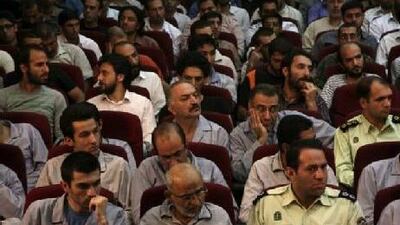The banning of two leading reformist political parties is another attempt by the establishment to stifle voices of the beleaguered reformist movement and keep it fragmented, according to analysts.
The dissolution of the Islamic Iran Participation Front (IIPF) and the Islamic Revolution Mujaheddin Organisation (IRMO) both of which backed the country's main opposition leader, Mir Hossein Mousavi, was announced on Monday.
It came after an attack this month by vigilantes, backed by plainclothes security men, on the home of the other main opposition leader, Mehdi Karrubi. Mr Mousavi's office was also raided, while security forces kept visitors from his home on several occasions. Both men, branded "leaders of sedition" by the regime, challenged Mahmoud Ahmadinejad in last year's presidential elections, which they insist he won by fraud.
Judicial and other measures used to pressure the reformists are evidence that the system has no intention of making an opening them, despite grappling at the same with a highly public rift in the ruling conservative establishment, Iran experts said. A court ordered the ban at the request of the interior ministry, which oversaw last year's presidential election, the judiciary's hard-line spokesman and prosecutor general, Gholam Hossein Mohseni Eje'i, said on Monday. "They are not allowed to have any activities."
The IIPF, however, denied it had been banned. Ali Shakouri-rad, its spokesman, said the party had received no notification of any such court verdict, which he said could not be enforced "because the IIPF must be given a chance to appeal". He told the BBC's Persian television channel: "Mr Eje'i is either misinformed or he is lying." The verbal announcement of the ban was "psychological warfare", an IIPF statement said yesterday.
Observers believe the confusion stemmed from legal technicalities: the court process banning the two parties may not have been completed, but the judiciary has made clear neither will be allowed to operate in any circumstances. Scott Lucas, an Iran expert at Birmingham University in England said: "That's significant because my information is that at least one conservative, Mohsen Rezaie, had sounded out the supreme leader [Ayatollah Ali Khamenei] about bringing reformists into some kind of national unity government. The information was that the supreme leader basically said, 'no opening to them'."
Mr Rezaie, a former Revolutionary Guards commander, was the only conservative candidate in last year's presidential elections. He is an ally of the former president Hashemi Rafsanjani and a bitter opponent of Mr Ahmadinejad. There is also suspicion that the two parties were banned because seven of their members who are serving long prison terms filed a complaint to the judiciary in July that Revolutionary Guard commanders at a Tehran base had actively orchestrated plans to ensure Mr Ahmadinejad's re-election.
The ban on the two reformist parties, which are closely tied, means they can no longer issue statements legally, further undermining the opposition movement's ability to address its followers. The ability of the reformists to operate within the system now rests mainly with individual MPs in the conservative-dominated parliament. Most reformist newspapers have been closed since the disputed election last year and scores of journalists have been jailed.
Harsh repression by security forces has kept opposition protesters off the streets since the beginning of the year, although Mr Mousavi and Mr Karrubi have remained defiantly outspoken, despite persistent calls from leading hardliners for them to be arrested and tried for sedition. The regime has ignored such calls, apparently loath to make them martyrs or spark fresh unrest. But members of the two seemingly banned reformist parties were jailed during last year's post-election unrest, in which thousands of opposition supporters were detained. The IIPF's secretary general, Mohsen Mirdamadi, remains in jail, along with 15 other members of his party, which is viewed as the first modern Iranian political party after the Islamic Revolution in 1979.
Apart from blogs and social networking websites, the opposition has few channels to reach its followers. The ban on the two parties came from the judiciary, a bastion of conservative opposition to Mr Ahmadinejad, which is headed by Ayatollah Sadegh Larijani. His brother, Ali Larijani, the parliamentary speaker, is another key rival of the president. Mr Ahmadinejad's influential conservative opponents accuse him of economic mismanagement, adventurous foreign policy and, most significantly, of trying to monopolise power in the presidency at the expense of other institutions such as the parliament.
Mr Mousavi and Mr Karrubi have levelled similar accusations, but the conservative elite has made clear it has no interest in accommodation with the reformists, despite common antipathy to the president. "The conservatives are going to keep them well boxed out," Prof Lucas said.

